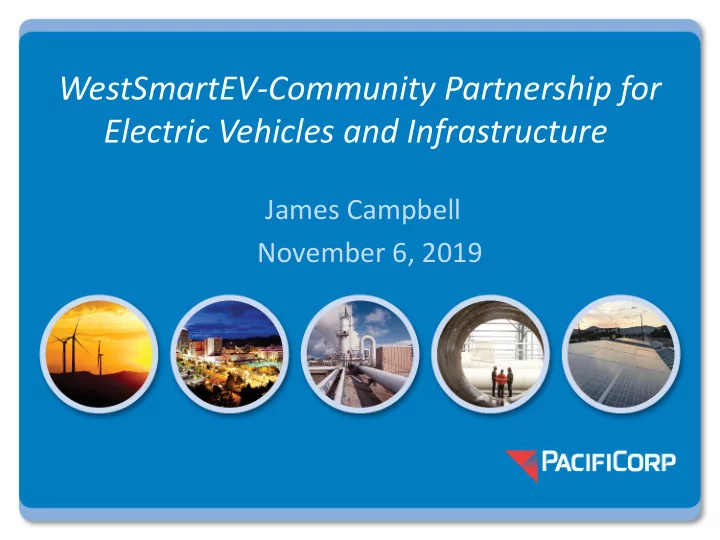

WestSmartEV-Community Partnership for Electric Vehicles and Infrastructure James Campbell November 6, 2019
Then there was light… 2
Transportation Crisis – Urban Pollution 3
Electric Transporation 4
WestSmart EV Task 2 Workplace Task 1 Electric Highways: Charging: Workshops and 1,500 miles of electrified 600+ L2 at work locations interstate with 65+ DCFC (completed) Task 3 EV Adoption Task 4 Smart Mobility: Pilots: Incentives for All electric solutions in 200+ EV purchases urban areas (completed) Task 5 WSEV Central: Task 6 Outreach: Lessons Data collection, analysis, learned dissemination, modeling, lessons learned materials, workshops 5
DCFC Usage by EV Owner Location State-wide use Urban use Most frequent use comes from EV drivers who live outside/on outskirts of population centers. DCFC use by EV drivers in the city tends to be less frequent 6
DCFC Corridor Usage 7
Smart mobility services Launched LYFT electric program • Incentivize drivers to participate • Train drivers to be EV ambassadors • Provide access to multiple strategically located fast charging stations • On-site Fast Chargers • Download App that tracks charging location and characteristics Photo: RMP Launched electric car share program with Envoy There group • Car share for residents includes short and long range EVs • Includes high-end, student, low income housing Photo: Giv Develoment 8
Smart mobility e-bus Six electric buses Y2 rollout planning: Salt Lake City • Park City bus route • Collected real world drive cycles • Compiled data of both charger and • Developed electric bus system bus performance for 2 years planning tool Photo: Park City Transit Most traveled EV route in the US 18.3 MPGe (Diesel is 4 MPG) 9
What’s Next Multi-Modal Transit Hubs • Integrate light-rail, electric buses, delivery trucks, ride hailing, and public charging infrastructure • Develop power balance and demand response control system to reduce initial infrastructure costs and demand charges • Expand to 50 locations 10
Recommend
More recommend